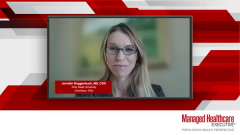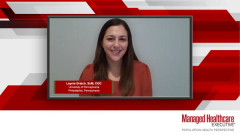
Unmet Needs in the Management of ALS
The unmet needs in ALS treatment management are explored.
Episodes in this series

Laynie Dratch, ScM, CGC: There might be varying unmet needs from individual to individual for those diagnosed with ALS [amyotrophic lateral sclerosis]. One unmet need that strikes me most as a genetic counselor is the need for all individuals with ALS to have the offer of genetic testing and some form of counseling about this genetic testing option. It’s extremely important that every individual is offered the ability to meet with a genetic counselor or speak with a neurologist who’s knowledgeable in the genetic testing process, so that they have the opportunity to integrate genetics as part of their care.
There are many benefits to a genetic diagnosis beyond potential access to trials and treatments. For example, a genetic diagnosis can be an answer to a big question: “Why have I developed this diagnosis?” Many patients with ALS wonder, “Is it something I did or something I didn’t do in my lifetime?” For some patients, those questions are answerable. A genetic difference that you were born with put you at high risk to develop this disease. Sometimes, it can be an end to a diagnostic odyssey. If ALS is high on the differential and a genetic cause of ALS is identified, it might solidify the diagnosis and avoid further work-up that might have been offered. For some individuals, it can also allow them to anticipate other future medical needs, like the risk of frontotemporal degeneration or Parkinson disease–like symptoms. For some patients, it might be an impact prognosis: Is this a variant associated with faster or slower progression over time? It can also provide information to family members. Are loved ones at risk for ALS?
The vast majority of the genetic forms of ALS are inherited in an autosomal dominant pattern. That’s a 50% chance that each child inherits the same genetic difference. Whether that goes on to cause the individual to develop disease depends on many factors, including penetrance: if you have a genetic difference, what are the odds that symptoms will develop? That varies from gene to gene and variant to variant. It can provide this information to the family, so family members may consider predictive genetic counseling and testing. Knowing you might have risk can aid in many elements of an individual’s life, like family planning, life planning, retirement planning, where you want to live, what you want your house to look like. But predictive genetic counseling and testing is a highly personal decision and not for everybody. There are many benefits to a genetic diagnosis beyond trials and treatment opportunities.
Jennifer Roggenbuck, MS, LGC: Regardingthe unmet needs in the management of ALS, there’s a significant geographic disparity in terms of access to care. Patients who live in rural areas may not have the opportunities in a multidisciplinary clinic, and they might not have access to the full range of services that exist for individuals with ALS. We’ve been experimenting with telemedicine to enable individuals who live in remote areas to access care remotely. Some of that care requires hands-on interventions and actual physical visits to the clinic, but there’s a lot of variability in terms of the quality of care and how well that care meets the needs of an individual with ALS.
Another disparity, in my area, is patients not being offered genetic testing. It’s usually patients who present to multidisciplinary clinics, especially at academic medical centers, who are offered genetic testing. However, all patients with ALS could have a genetic cause, so all patients should be offered comprehensive genetic testing. That’s another disparity that could be addressed by incorporating genetic testing as part of the routine management for patients with ALS, whether that happens at an academic medical center or a community neurologist office outside an urban area.
Transcript edited for clarity.
Newsletter
Get the latest industry news, event updates, and more from Managed healthcare Executive.






















